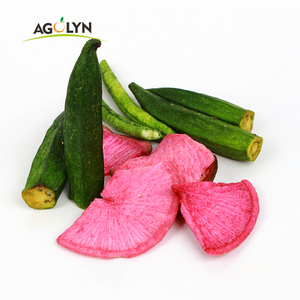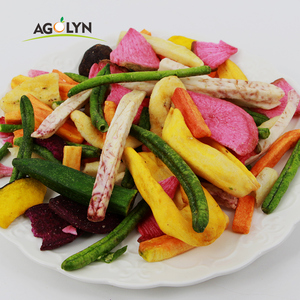
All categories
Featured selections
Trade Assurance
Buyer Central
Help Center
Get the app
Become a supplier

(40 products available)










































Dehydrated veggie chips come in different types, each offering a unique taste and texture. This variety caters to different nutritional needs and preferences. The following are some of the most popular types:
Beet Chips
Beetroot chips have an earthy and sweet taste, depending on how the beets are cooked. When raw, beets have a very earthy taste, with rich, complex earthiness. They taste different when roasted or cooked because the heat brings out their natural sweetness, making them taste more sweet and mild. The cooking method also changes the toughness. Raw beets are firm and crunchy, while cooked ones become softer and less crunchy. The taste of cooked beets also depends on the spices added to them.
Carrot Chips
Dot thinly sliced organic dehydrated carrot strips have a mild, slightly sweet taste. When raw, carrots are crunchy with a fresh, slightly sweet taste, but when roasted or baked, the natural sugars caramelize, making them sweeter, more fragile, and tastier. The cooking process also reduces their moisture content, making them crunchy but more bland and less vibrant than raw carrot chips.
Sweet Potato Chips
Sweet potato chips have a naturally sweet, nutty, and creamy flavor, slightly different from a normal potato. Raw sweet potatoes taste starchy but have a mild sweetness. After roasting or baking, the natural sweetness increases, making the chips taste sweeter and more nutty. Decreasing has a similar effect, increasing crunchiness and taking away the earthy and starchy blandness.
Kale Chips
Kale chips are crispy and can be slightly bitter or very flavorful, depending on the spices used. Raw kale leaves can be bitter and slightly peppery, with a grassy depth depending on the type. When kale is baked to make chips, the bitterness lessens, and the leaves get crispy. Adding oil and spices to kale before cooking it gives the chips a rich and tasty flavor that balances the natural bitterness.
Zucchini Chips
Zucchini chips are mild and slightly herbaceous, with a slightly grassy or herb-like taste. Raw zucchini is crisp and cool, with a faintly grassy, very mild, and almost neutral pepper-like taste. Baked or roasted zucchini chips become more fragile, and their moisture is reduced, making the flavor more concentrated and a bit more bland.
Beets
Dehydrated beet chips are made from beetroots, which are usually bright red vegetables but can also be yellow or white. Before dehydrating, beets are usually sliced into thin rounds or strips, about 1/8 inch thick. It is important to keep them even so that they dry at the same rate. Beets have a natural sweetness and earthy flavor that becomes more concentrated when dried. They are packed with nutrients, including vitamins A, C, B6, iron, potassium, and manganese.
Carrots
Dehydrated carrot chips are made from ordinary orange carrots, but sometimes they can be made from other types of carrots, like purple, white, or tender, sweet baby ones. Carrots are sliced into thin rounds or sticks, usually about 1/8 inch thick. Carrots are naturally sweet, with a slightly earthy flavor that becomes more intense when dried. Carrots are high in beta-carotene, fiber, antioxidants, vitamin K1, and other powerful nutrients.
Sweet Potatoes
Sweet potato chips are made from orange or purple-fleshed sweet potatoes, which are starchy tubers with naturally sweet, earthy, and rich soil-like flavors. Before dehydrating, sweet potatoes are sliced into thin rounds or strips, about 1/4 inch thick. Slice them evenly to ensure they dry at the same rate. When dried, they develop a subtle sweetness, earthy depth, and a chewy or crunchy texture, depending on the drying method used.
Kale
Kale chips are made from curly or lacinato kale. Curly kale has tightly crinked and frilly leaves, while lacinato kale has long, narrow, and flat blue-green leaves. Before dehydrating, kale leaves are torn into bite-sized pieces, removing the thick stems. Raw kale has a peppery, grassy taste, but when baked or dehydrated, it becomes crispy and has a more concentrated, slightly bitter flavor. This changes the texture from crisp and firm to crispy and crunchy.
Zucchini
Zucchini chips are made from zucchinis, which are summer squashes. They look like elongated cucumbers with smooth, shiny skin that is often dark green, though sometimes yellow or light green. Before dehydrating, zucchinis are sliced into thin rounds or half-moons, about 1/8 inch thick. Zucchini has a mild, slightly grassy flavor that becomes more concentrated when dried. It is low in calories and high in moisture, which makes the chips healthy and good for losing weight.
Dehydrated veggie chips are unique because they provide the crunch and convenience of normal chips without the guilt. They also add the benefit of nutrition to the everyday diet.
Nutrient Preservation
Normally, cooking vegetables makes them lose some vitamins, minerals, and antioxidants. But with dehydrated veggie chips, only the water is removed without cooking, and most nutrients are retained. This makes them healthier than regular veggie snacks.
Long Shelf Life
Dehydration removes the water, which makes the chips last longer because bacteria and mold cannot grow without moisture. It allows people to store and eat these chips for a longer period without worrying about them spoiling.
Low Calorie and High Fiber
Dehydrated veggie chips have fewer calories than regular potato chips because no oil or frying is needed. They are full of fiber because removing the water makes them smaller and denser. This helps people feel full longer and prevents overeating. They are also vegan, so everyone can eat them.
Portability
Dehydrated veggie chips are light and can be easily carried anywhere, making them a very convenient snack. They are good for people looking for healthy snacks to take to work, school, or while traveling.
Variety of Flavors
Dehydrated veggie chips can be made from many different veggies, like kale, zucchini, and broccoli. They can be made spicy, sweet, or even cheesy by adding different seasonings. This gives a large number of options from which people can choose their favorite flavor without added fat or calories.
Healthy Snack Alternative
Dehydrated veggie chips are popular as a healthy snack because they have fewer calories than regular potato chips. They are made from vegetables and have vitamins, minerals, and antioxidants, making them healthier than regular crunchy snacks. Carrot chips have less starch and sugar than potato chips, making them a healthy alternative.
Preserves Nutrients
Dehydrated veggie chips keep the nutrients that veggies have, like vitamins and minerals, because there is no frying or cooking involved. Organic kale chips have many vitamins and minerals, such as calcium, iron, and vitamins A, C, and K, and they stay in even after dehydration.
High Fiber Content
Dehydrated veggie chips are full of fiber, which helps people feel full longer and is good for the digestive system. Beet chips also have dietary fiber, which helps with digestion and makes people feel full longer, so they eat fewer other unhealthy snacks.
Versatile and Convenient
Dehydrated veggie chips, like zucchini chips, are easy to take anywhere and can be eaten on the go, making them a quick and easy healthy choice. They are also very versatile; anything can be used to make them, and different spices can be added to change the flavor.
Supports Healthy Digestion
The high fiber content in veggie chips promotes healthy bowel movements and gut bacteria. Carrot chips have dietary fiber that helps food move through the digestive system and promotes the growth of healthy gut bacteria.
Weight Management
Eating dehydrated veggie chips can help people control their weight because they are low in calories and high in fiber. Kale chips are low in calories but high in fiber, which helps people control their weight and reduces the risk of obesity and other weight-related issues. Veggie chips have great crunch and flavor and are a better choice for weight management than regular chips.
Organic and Natural Ingredients
When selecting dehydrated veggie chips, it is important to look for organic and natural ingredients. This is because organic products do not contain harmful chemicals, pesticides, or artificial additives. A buyer should also ensure that the dehydrated veggie chips are made from whole vegetables without added sugars or preservatives, ensuring they get a pure, nutritious product.
Variable Texture and Flavor
Dehydrated veggie chips are available in various textures and flavors, ranging from crispy kale chips to crunchy carrot chips. Customers may choose chips with stronger flavors, like seasoned zucchini chips, or milder ones in order to have a greater variety in their stock. Adjusting the texture may also be a good idea depending on the target market's preferences for thicker or lighter chips.
Quality of Dehydration
It is important to ensure the supplier uses quality dehydration processes that maintain nutrients and flavors. It is advisable to choose suppliers who use low-temperature dehydration methods because this preserves the natural vitamins and minerals in the veggies. Customers should also check chip texture to ensure they are crispy and not chewy or left moist inside.
Customizable Spice and Seasoning Options
Customers can enjoy a large variety of flavored veggie chips depending on the type and amount of spices and seasonings used. Buyers can get options ranging from spicy to savory so they can have the seasoned veggie chips that will appeal more to their customers. Request samples may be a good idea before making bulk orders to ensure the flavor profiles match the target market.
Packaging
In order to reduce wastage, buyers should ensure they get dehydrated veggie chips that come in resealable and robust packaging. Eco-friendly packaging may also be appealing to customers who support green initiatives. Buyers should also consider how the packaging is designed so the product can be brightly and visually appealing on a store's display.
Supplier Reputation and Reviews
When buying bulk products, customers should research supplier reputation and get reviews from other customers who have done business with them. Customers should ensure the supplier uses quality ingredients and offers consistency in product quality. They should also assess customer service quality and response time because this may affect order fulfillment and any future issues.
A1: Veggie chips are healthy since they are low in calories and still have a good amount of dietary fiber. They also have vitamins, minerals, and antioxidants compared to regular chips. They are also vegan-based, so everyone can eat them.
A2: Dehydrated chips can last six months to one year when stored properly in a cool and dry place in airtight containers or packaging to prevent the entry of air and moisture.
A3: Yes, people can make dehydrated veggie chips at home using a dehydrator, oven, or air fryer, although it is more convenient to purchase them.
A4: Yes, dehydrated veggie chips keep most nutrients from fresh vegetables, including vitamins and minerals, since they are not cooked or fried like regular chips.
A5: Yes, they are gluten-free as they are made only from vegetables, spices, and seasonings without added grains or gluten-containing ingredients.